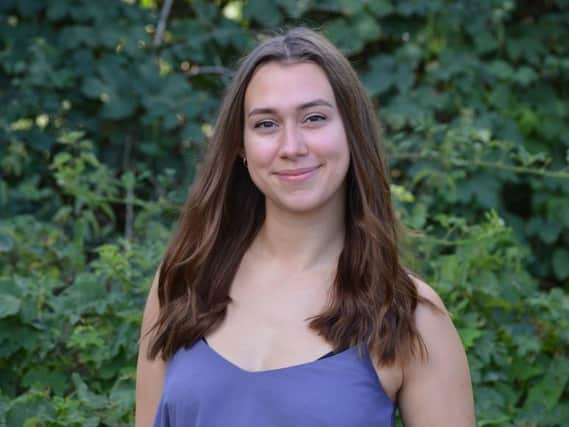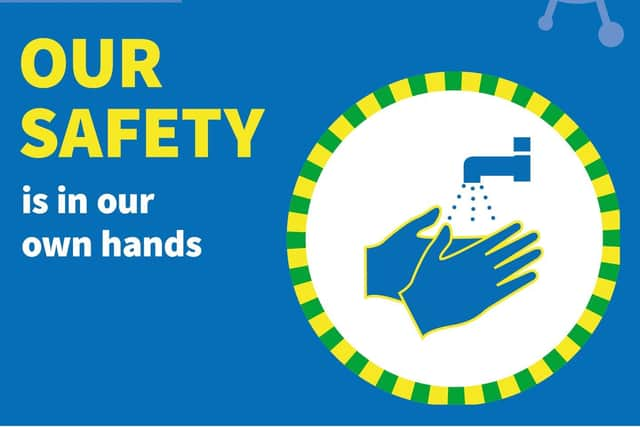Animal-loving welfare enforcement officer Alice helping protect Banbury's livestock


But with social distancing, self-isolation, and limited contact with others Oxfordshire Trading Standards face a huge challenge, ensuring farming checks and animal inspections continue; and are carried out safely.
Luckily they have animal lover Alice Harsant in their team.
Alice, 25, is one of the county council’s Animal Health and Welfare Enforcement Officers, working in the Banbury area and across Oxfordshire.


Advertisement
Hide AdAdvertisement
Hide AdShe is finding innovative ways to continue working, whilst playing her part in the #Stopthespread anti-coronavirus campaign.
Alice said: “I’d always wanted a career involving animals.
“As I grew older, I realised working with people was also a passion. My trading standards role allows me to do both, making a really positive difference to farmers and the broader Oxfordshire community.
“When I return home, I’m welcomed by Abi, my 18-year-old cat, and by two rabbits, David and Alexis. There’s also a tank full of cherry shrimp. Perfect!”
Despite having two degrees – BSc in Animal Sciences (University of Nottingham) and MSc in biodiversity and conservation (University of Leeds) – nothing could prepare her for the challenges COVID-19 has brought.
Advertisement
Hide AdAdvertisement
Hide AdAlice added: “We enforce legislation that covers the health, welfare, disease prevention and traceability of farm animals, as well as laws relating to animal feeding stuffs.
“But you can’t just wander onto farms. There has to be interaction with the farmers, and you don’t want to risk bringing infection in with you.
“I primarily respond to animal welfare complaints, so the majority of visits are unannounced.
“I investigate not only the complaint, but also the welfare of any other animals on the farm. Occasionally this involves other agencies; lots of people can be involved and if necessary, I obtain evidence for prosecution.”
Advertisement
Hide AdAdvertisement
Hide AdIt is apparent that Alice’s work cannot avoid travel, human contact, or visiting a wide range of locations across Oxfordshire that are essential to the food supply chain, and hygiene critical.
Adapting
So, how has she adapted to ensure safety is maintained, and the risk of spreading COVID-19 is reduced to an absolute minimum?
Alice said: “I’m homebased now. We’ve fully embraced technology as a team to stay in touch. We’re all treating #stopthespread extremely seriously.
“But it’s when I’m visiting farms and other centres that's when the challenge really starts.
Advertisement
Hide AdAdvertisement
Hide Ad“When the pandemic arrived, the team temporarily paused routine inspections, focusing on complaints and critical control points such as markets and abattoirs.
“Most farmers live on the same land as their livestock, operating their business from their homes. This meant I had to move my work from domestic premises to more open areas, such as fields.
“I monitor and examine paperwork, holding registers, movement records, details of on-farm deaths, disposal of carcases, and veterinary medicine records. Many farmers hold these details in paper copy only. Sharing them by email simply isn’t an option.”
Inspection
Recently Alice was put to the test, tipped-off about a farm that failed to dispose of dead livestock correctly and had animal welfare concerns.
Advertisement
Hide AdAdvertisement
Hide AdTrading Standards visited the farm just before lockdown with colleagues from the Animal Plant Health Agency, but it required a revisit to ensure guidance was followed and to check paperwork.
Alice arranged this second visit. Records that needed to be examined were moved to a suitable location on the farm, away from the owner’s house.
She then completed a personal self-assessment of her health in advance of the visit, taking suitable personal protective equipment (PPE) so that clothing and footwear could be disinfected both on and off the premises.
Washing hands before entering and leaving the farm was essential, so Alice ensured she carried a supply of water and soap.
Advertisement
Hide AdAdvertisement
Hide AdDisposable gloves were worn during examination of the documents. And throughout the record checks, the farmer was available at another location and contactable by phone to discuss any queries.
Thankfully there were only minor problems found that were easily resolved, leading to both parties walking away happy.
If you have any concerns related to the health or welfare of livestock, including farm animals kept as pets, phone Trading Standards (office hours) on 01865 895999 or email [email protected]
Alice added: “I’m pleased with how quickly we’ve adapted.
“The vast majority of Oxfordshire farmers are committed to very high standards of animal welfare. They understand I need to continue to visit occasionally as part of routine inspections, or to give advice and support.
Advertisement
Hide AdAdvertisement
Hide Ad“They’re as worried as everyone else about catching COVID-19 and the potential impact on their ability to continue operating, so they’re happy to adapt for trading standards.
“Everyone in our team takes COVID-19 precautions extremely seriously, not just professionally, but round the clock. It’s important for us all to stay safe.
“I encourage family, friends and neighbours to follow the guidelines, regularly wash your hands, wear facemasks as required, and continue to respect social distancing.
“I’m looking forward to visiting Oxfordshire farms without needing to take extra precautions. That day will only come if everyone follows the rules. It’s the only way we’ll eradicate this horrible disease.”
Advertisement
Hide AdAdvertisement
Hide AdAnsaf Azhar, director of public health for Oxfordshire County Council, said: “Alice is taking great care to abide by national guidelines that are keeping us as safe as possible. I urge everyone in Oxfordshire to continue to follow her example. Don’t relax and give COVID-19 the advantage. Together we can stop the spread.”